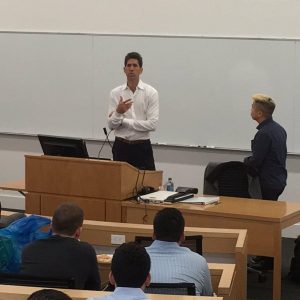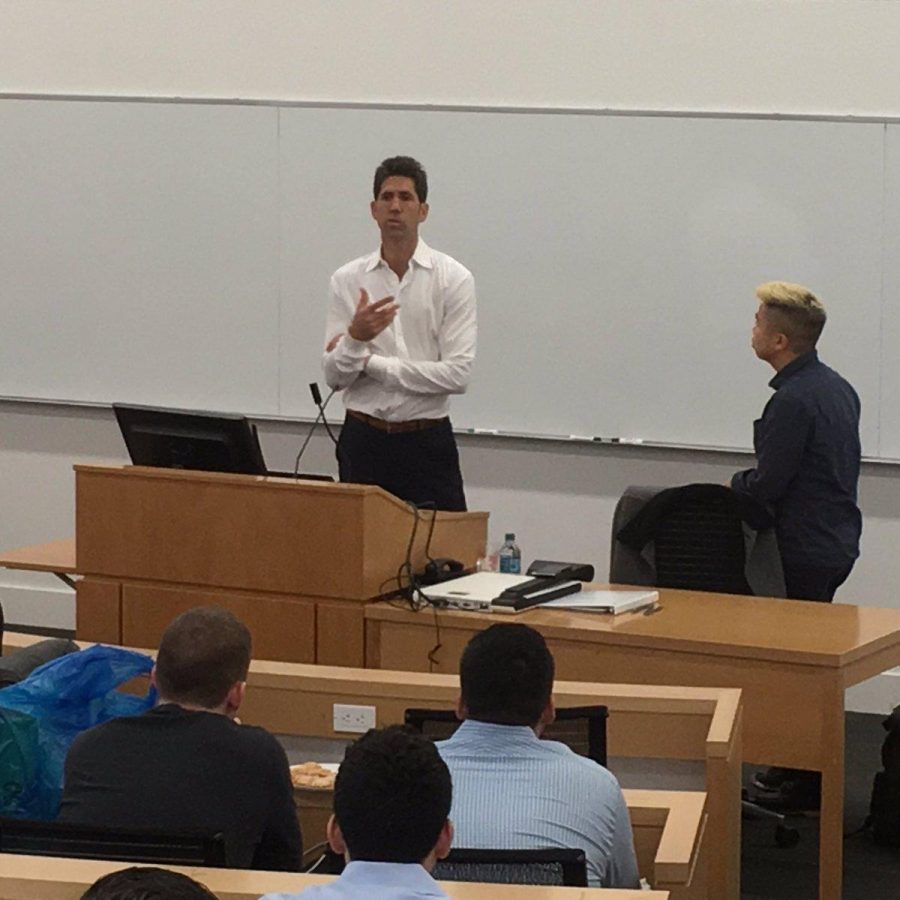By Alvin Halimwidjaya

“[The] NBA sounds big; it’s not big. It’s politics, entertainment; it’s all small. It’s not huge.” For such a small world, the people in it are giants, and 6’7” Bob Myers is no different.
The 42-year-old general manager of the Golden State Warriors came to the Fordham Lincoln Center Law School on Tuesday, Feb. 27 to talk to students about the path he’s taken to leading the front office of the best team in the NBA. Myers credited law school as a key factor to his success, recalling the traumatic experience of his bar exam and encouraging everyone in the room to go to law school, regardless of their career path. He also took the time to emphasize the importance of hard work and sticking to one career path, despite the long wait that might be in store.
“So people would say I want to get involved with teams; go work in something in you want for 14 years that’s tangential to what you want to do and see what happens,” said Myers. “See how many people will stick with that… My point is it’s a very hard thing to get into. Probably the most important thing is you need to be ready when that opportunity comes.”
Myers told his audience that their desire, work ethic and network are essential to success because it can come from so many different paths. He used his friend Neil Olshey, who went from playing lacrosse at Le Moynes to becoming an actor in LA and a bouncer in New York as an example. Now he’s the general manager for the Portland Trailblazers after working in the Los Angeles Clippers front office.
Myers started out working for sports agent Arm Tellem in a very limited capacity. He began as an intern after graduating from UCLA while going to night classes at Loyola Law School. Myers became vice president of SFX Sports in 2000 and remained an agent for a list of players including Brandon Roy and Tyreke Evans. In April 2011, he became the assistant general manager for the Warriors and was promoted to general manager before the 2012-2013 season. Coinciding with one of the best stretches of success the NBA has ever seen. When asked about the incredible players and staff assembled to win two championships and boast a 73-win season, Myers pointed to the importance of finding competitive people with the right mindset. Despite being difficult to deal with, he said that he would consistently hire people who hate to lose.
“If I give you guys a job and some team of five had won 10 in a row I’d want that team to feel not like, ‘Hey, we won 10 in a row we’re good. We don’t need to do anything.’ I want that team to go, ‘Let’s win every effing game we can because we don’t want to lose. And we’re going up against a team that hasn’t won a game at all. So what? Let’s just beat them too.’”
As the Warriors have stepped into the national spotlight, their critics have been coming out of the woodwork and more and more pressure has been placed on the Warriors, which Myers recognizes. Consequently, he highlighted the importance of building the team up with people who can take accountability, “lose gracefully and fail eloquently.”
“Picture being at work and somebody sends you a text message and says, ‘Did you see what they said about you today?’ When I try to construct a team, I want to know who you are in your worst moment because when you win, everybody’s in a good mood, it’s easy. The most revealing moment for me about our players was when we lost because you learn so much more from failure than success. And so when we lost in Game 7 of the Finals, they did react to losing in such a good way where nobody blamed each other. Nobody blamed anybody else. They took the responsibility for themselves. That allowed me to believe that it was the right group of guys and that we could go forward with them.”
Despite the success he’s experienced through the organization, Myers is a firm believer in doing what you love, and it’s clear that his love is for basketball. A well-publicized basketball junkie, he spearheads staff pickup games both within and between organizations. The most interesting competition the Warriors staff has taken on has been the ongoing six-year annual series against the San Quentin State Prison inmates. But for Myers, it’s extended to beyond just basketball.
“Playing basketball in St. Quentin is a different experience… Some of us have better chances than others. I had a better chance than the guys in San Quentin to make it in life. Had I been born into what they were born, I could’ve easily been in San Quentin. And I think I realize it’s humbling in that these guys have probably made one or two mistakes in their life, maybe some bad ones. But what led them to those mistakes and how they ended up making those mistakes is a story that often doesn’t get told.”
Myers went on to say that the experience humanized his perception of the prison population, as well as informed him on prison reform. “And they’re good at basketball, too,” he added. “It’s hard to play there.”
Myers also fielded a few more present questions on his role in the organization and the current state of the Warriors. He talked about the importance of simultaneously looking at the game in front of them and the draft and free agency two or three years into the future, and the difficulty of constantly gunning for a championship year in and year out. Myers also acknowledged the difficulty of being the general manager of a sports team, saying that “the hardest thing to do is manage human beings.” He brought up examples that illustrate the importance of cultivating substantial relationships with each of his players, from talking to Draymond Green about his multiple technical fouls to risk of bringing in alleged troublemakers like Javale McGee and Nick Young; in the latter cases, Myers believes that the positive culture they’ve created within the Warriors organization will affect anyone and build them up, saying that, “we believe that the rising tide lifts all boats.”
Despite the range of different questions he got, Myers constantly reminded everyone to not get wrapped up in a career and build up a personal life, pointing to his wife and two daughters as his most important priorities. Myers has proven himself to be one of the best GMs in the league and his approach to every other aspect of his life is the same way he leads an NBA front office. When someone asked about how the Warriors managed to flip a relatively measly $3.5 million for an All-Rookie candidate in big man Jordan Bell, Myers preached the same philosophy he had been the entire one hour and fifteen minutes. While the Warriors worked on their end to secure a draft pick Myers was talking to Jordan Bell’s agent, who happened to be Arn Tellem’s son.
“I used to work out Michael Tellem when he was four years old shooting baskets and it was just I was going to law school in UCLA and my boss said will you work out my kid in the driveway: that’s Michael Tellem, Jordan Bell’s agent. That’s my point. Whatever you’re doing now matters. Every single thing you do, every single person you meet, matters. I promise. There are people that you will work for that will work for you as crazy as that will be. There are people that may be firing you in ten years they’re going to call you and say, ‘Can you give me a referral?’ That’s life. That is how small it gets.”






































































































































































































James Hamilton • Sep 2, 2020 at 4:51 pm
Hi, my name is James Hamilton. I am currently a 2L at Fordham law and am on the board of the Sports Law Forum. I was wondering if you had any information on a point of contact for whoever but this event together as we would love to looking into have Mr. Meyer participate virtually in our National Basketball Negotiation competition or our symposium.
Any help would be greatly appreciated